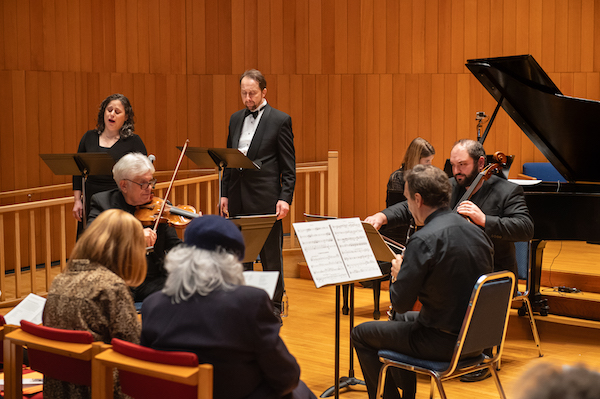A timely world premiere resonates with echoes of the Holocaust

Timeliness in works of art is an uncertain thing. A headline may inspire a piece, but by the time the public sees the work, later developments may have passed it by. Conversely, a worthy work of general interest may be lifted by events to a more acute kind of significance.
The latter is what happened to composer Gerald Cohen and poet Menachem Z. Rosensaft, as their song cycle they burn, the fires of the night: lamentations from the ashes, a powerful and moving work memorializing the murdered Jews of 1940s Germany, had its world premiere Wednesday night amid news of fresh cruelty and suffering in Israel and Gaza.
Months in the planning, the concert took place at the Heller Museum of Hebrew Union College on West 4th Street. The presenter, the Defiant Requiem Foundation, is known for its contemporary re-enactments of a historic performance of Verdi’s Requiem by prisoners at the Theresienstadt concentration camp. Its mission has expanded to include other artistic endeavors, exploring “ways in which individuals facing barbaric acts of genocide today can find the strength and courage to survive.”
The day’s headlines, however, remained a subtext at this concert, hosted by the foundation’s president and artistic director, conductor Murry Sidlin. In his remarks and a question-and-answer session afterward, Sidlin kept attention focused on the new work and the shorter pieces on the program, rather than world events.
In any case, remembering the Holocaust and taking lessons from it is part of the forever human project. Poet Rosensaft, the child of Holocaust survivors, born just after the war in the Bergen-Belsen displaced persons camp, evoked life and death in the camps in imagery ranging from shockingly violent to dreamy and nostalgic.
Cohen’s settings for mezzo-soprano, baritone, and chamber ensemble—the same instruments for which Olivier Messiaen composed his prison-camp masterpiece, Quartet for the End of Time—covered a similar musical range from jagged dissonance to tender triadic harmonies, tracing the song cycle’s arc from horror to at least a glimmer of hope.
The work began not with poetry but a prose prologue, setting an excerpt from a memoir by the poet’s mother, Hadassah Rosensaft, recalling her separation from her five-and-a-half-year-old son (the poet’s half-brother) in the camp, and the child’s question: “Mommy, are we going to live or die?” The strong-voiced mezzo-soprano Leah Wool respected the objectivity of the narrative, only subtly conveying its horror and heartbreak.
The instrumental ensemble—violinist Herbert Greenberg, clarinetist Jon Manasse, cellist Julian Schwarz, and pianist Marika Bournaki—was under no such constraints, evoking anxiety, cruel faces, the fog of memory, a child’s simplicity, and lastly a terrible, clanging finality.
Seven settings of poems followed: Singer Wool and stout-toned baritone David Kravitz alternated lines in “Psalm 23 at Auschwitz,” a bitter parody of the famous biblical verses (“no shepherd/only foes”). Kravitz raged in stentorian fortissimo in “A Refusal to Forgive the Death, by Gas, of a Child in Birkenau,” before returning tenderly to thoughts of the poet’s half-brother, “my mother’s child/his ashes diffused/toward the stars.”
In “Knit Doll at Bergen-Belsen,” Wool drew a quiet but devastating portrait of another child amid disease and privation (“the little girl/hugs her knit doll/as she plays/among corpses”). In “Ne’ilah,” to minimal accompaniment, a hushed Kravitz looked on as “my brother’s child shadow/fades gently/…into never.”
The cycle seemed to turn a corner of history at that point, as the two singers became “The Second Generation,” that is, “the heirs of Auschwitz and Ponar” declaring over a swelling accompaniment that “ours is also the rainbow/in us the storm meets sunlight.” In “blessed is the soul,” singer Wool intoned a serene at first, then stirring, tribute to the poet’s mother, who emerged from the death camps “to create hope/not tears/to teach life/not sorrow.”
But Cohen and Rosensaft chose to end the cycle on a note of stark warning—as if one were needed in this week of dire news—with the title song, “they burn, the fires of the night.” Singer Kravitz roared out a protest against cruelty and killing that shook its fist at Heaven, “each soul reminding God/here is another song/You will not hear again/You can never again create.” The ensemble’s fierce postlude was a reminder that, for all the hope and kindness humans bring into the world, the forces of hatred and violence await those who don’t work to mitigate them.
With its strong vocal writing and colorful mood-painting in the ensemble, this challenging work would be a welcome addition to any Holocaust remembrance.
The aforementioned players prefaced the featured work with performances of two movements from Messiaen’s Quartet and four pieces by composers who died in the Holocaust. Clarinetist Manasse floated gorgeous long notes and twittered in Messiaen’s “The Abyss of Birds,” while cellist Schwarz poured out an endless song over Bournaki’s slow piano chords in “Praise to the Eternity of Jesus.”
The fifth movement of Viktor Ullmann’s Piano Sonata No. 7 mixed a Hebrew song, a Lutheran chorale, a Czech dance and the B-A-C-H motive in a clangorous stew of musical tribute.
James Simon’s Arioso for Unaccompanied Cello began in a resonant low monologue before blossoming into rolled chords and urgent double stops.
Greenberg and Bournaki combined for Robert Dauber’s Serenade for Violin and Piano, a tuneful, Kreisleresque confection rich in rubato and Schlag, with a polonaise-like dance in the middle.
Carlo Taube’s “A Jewish Child,” arranged for violin and piano, was a simple but fervent adagio of subtly Hebraic coloration—and a bridge to the pervasive child imagery of the song cycle to follow.